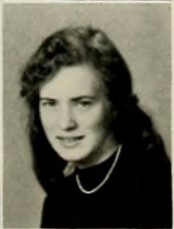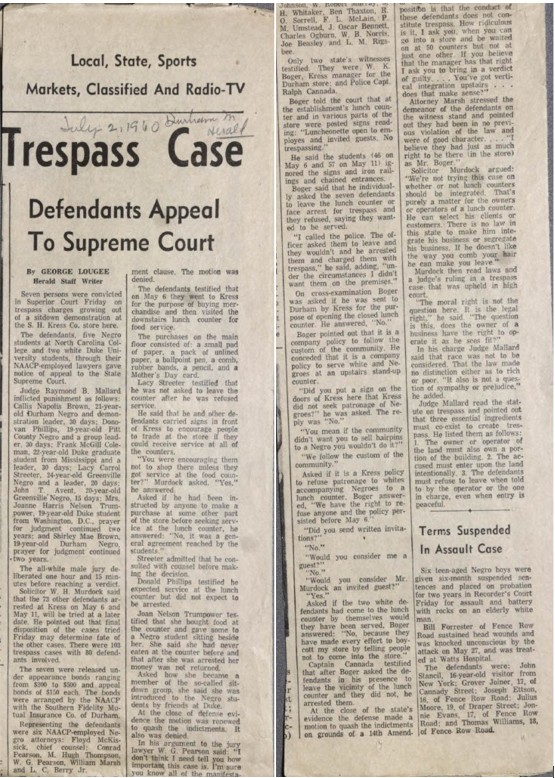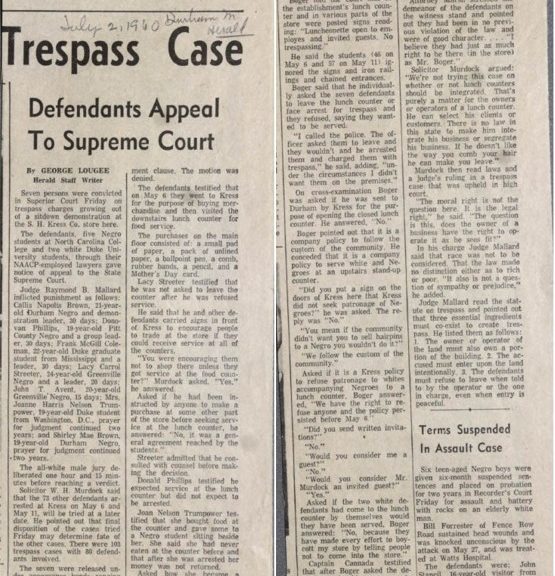Post contributed by Ani Karagianis, Centennial Archivist.
Hello again! You may have noticed if you follow the Devil’s Tale with as much fervor as I do, that this is a continuation of a blog series on Civil Rights, a series that will end whenever somebody stops me. This blog post highlights one person who had simultaneously stayed in the Georgian East Campus and spent time in prison for her participation in the Freedom Rides.
They say well behaved women seldom make history. Joan Mulholland, in the eyes of a segregated Duke in 1959, certainly fit that mold. A woman who was deemed odd for not rushing a sorority would later become a crucial member of the Freedom Rider movement, and has advocated for civil rights all her life.
Joan’s story begins in Washington D.C. in 1941. She was born to working parents, a father from Iowa and a mother from rural Georgia. Joan spent her early years in Arlington, VA, which she claimed, according to a 2013 oral history now housed at the Library of Congress and part of the Museum of African American History and Culture, “was definitely the South, maybe not the Deep South, but everything by law and custom was segregated.”[1] Growing up in a Presbyterian church, Joan would later become annoyed at the perceived hypocrisy of the church preaching equality in a segregated town. The church became an early place for her growing interest in civil rights, starting with Black students attending her then all white church, a move that had to be kept secret to maintain the safety of both Black and white students.[2] Joan would later note that “as a Southerner, that we needed to change. And when I had my chance to do something, I would seize it”[3] after viewing the stark differences between Black and white schools.
Fast forward a few years, and Joan started to look at colleges. While Joan wanted to go to a small school in Ohio, her mother, “a product of her environment” pushed Joan towards Duke University, a school that, according to Joan, “was safely segregated.”[4] At this point (1959), Duke University was still two years away from desegregating the graduate schools, and three years away from desegregating the undergrad population. Duke students had begun advocating for desegregation in 1948, when members of the Divinity School sent around a petition calling for desegregation. Unfortunately, these early efforts and the efforts throughout the 1950s fell on mostly deaf ears in the Board of Trustees.

Joan attended Duke for a year—1959-1960. Durham proved to be a great place for Joan to build on her growing desire to make things right, and North Carolina was a good spot for the growing Civil Rights movement. Not long after four students from North Carolina A&T in Greensboro integrated their lunch counter at Woolworth’s, Joan and some other white students attended sit-ins at segregated lunch counters in Durham with students from North Carolina Central University.


[1] Mulholland, Joan Trumpauer, Interviewee, John Dittmer, and U.S Civil Rights History Project. Joan Trumpauer Mulholland oral history interview conducted by John Dittmer in Arlington, Virginia. 2013. Video. https://www.loc.gov/item/2015669178/.
[2] Ibid.
[3] Ibid.
[4] Ibid.


